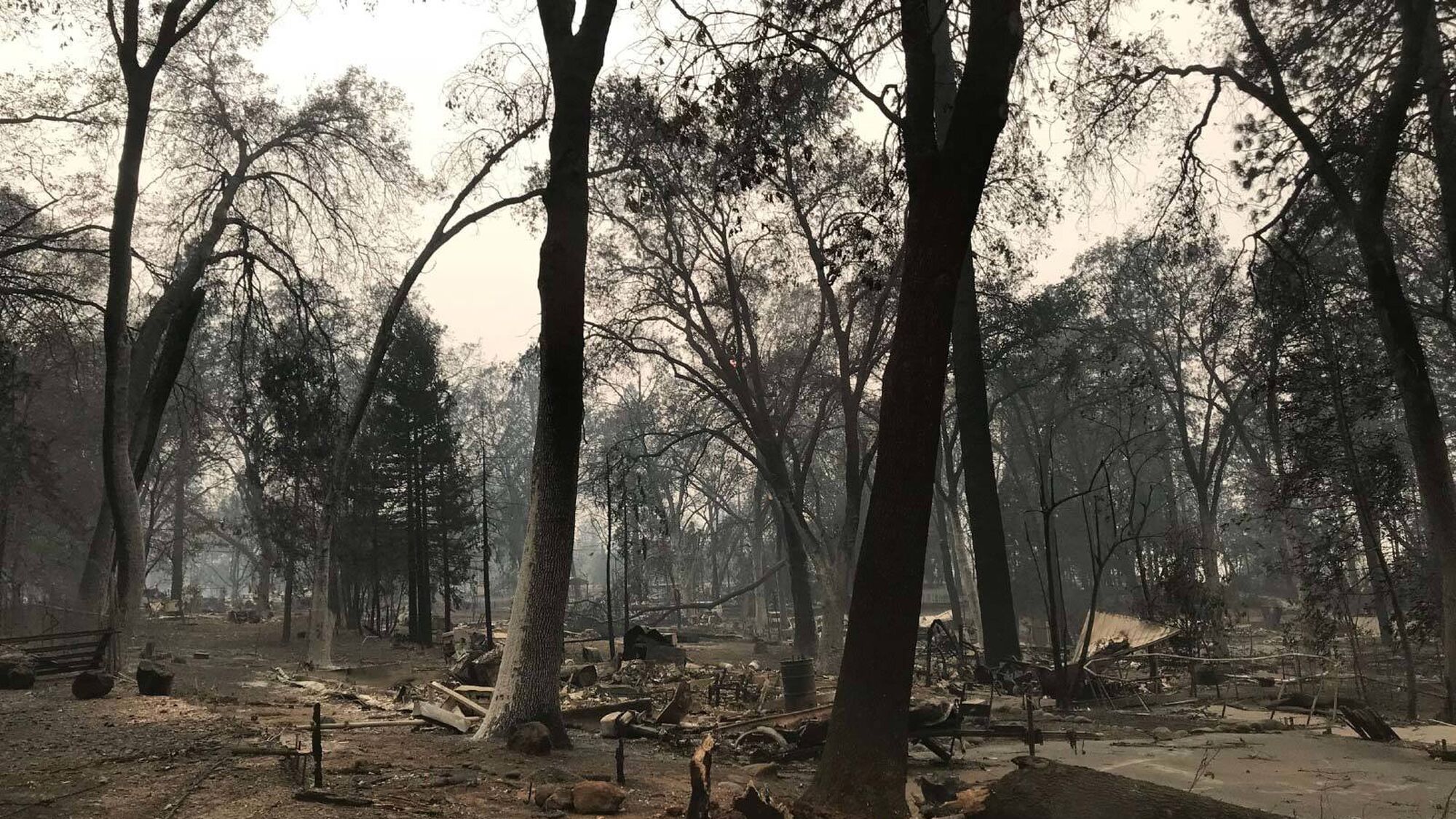“Nothing can come from nothing.” (King Lear: I, i, 92)
King Lear’s response to his daughter Cordelia’s refusal to flatter him is, at the very least, a failure of gratitude on his part. It’s one of the many motifs of that play where opposites flip back and forth. He accuses her of ingratitude, yet he’s the one refusing to be grateful for her loyalty and love. Her one word, “nothing,” is full of somethings.
Not that it’s easy to see something in nothing. Volunteers have spent days in the last weeks looking for lost or abandoned animals in the aftermath of the devastating Camp Fire in Paradise. We drive past police perimeter checkpoints into the interior where the fire ripped through the entire town. Yesterday my wife and I drove through the town of Paradise to Magalia. It’s normally about a 40 minute drive, but it took us over an hour-and-a-half. You may have seen photos of the devastation: burned out cars, chimneys standing guard over the ruins of a home, ash-covered landscapes that look like the moon. Driving through these landscapes, seeing the sweep of destruction is a whole other level of shock. You might see a damaged swing set or a square of concrete with two chairs facing each other, but the repetition of each ruined home is heartbreaking. I came upon my friend’s house, an NWP teacher-consultant and one of the greatest teachers in the country. Her two-story home where dinners, inservice planning, and leadership team meetings occurred, consisted of six inches of tissue-thin ash. The light during the drive itself was disorienting. Paradise had been a shady place, but now the sun, filtered by ash that looks like little bits of torn paper, illuminates and sharpens the wide-open destruction, daring us to take it all in. I heard my wife whisper, my God, there’s nothing left.
Paradise was an economically poor community. In California, housing is so expensive there are precious few places where you can live inexpensively, so the town was home to retired, disabled, undereducated, or underemployed people. Many who lost their homes were already living precariously. If they were renters, as many were, they now have nothing. If they were home owners, the insurance, if they had some, will not be enough to buy another home. As my city, Chico, struggles to house tens of thousands of fire refugees, the poorest of them are in shelters, in the parking lots of K-Mart, Wal-Mart, and vacant lots. They have nothing, materially.
Can something come from nothing? It’s not been an easy year. Hurricanes have scoured the landscapes, floods have inundated communities, parents have been separated from their children, random shootings have scarred our sense of security. With such losses, where do we find gratitude?
The uncertainty of the future, not just for displaced residents of Paradise, but for many people in the world today, is a blank page. We are faced with situations so grave that we don’t know what to do, where the enormity of the loss is overwhelming. What to write on this imposing blank page? The nothing stares at us and challenges us to hazard a word. Is this not our skill as writing teachers? We are the ones who understand that a blank page is both terrifying and the place of possibility, the place where paralysis meets potential. Our understanding of our praxis of the blank page is both practical and backed by a philosophy, or perhaps a faith, that students — people — each one of us, can write the first sentence, or start with the second sentence, or write a muddle that might or might not be the germ of a powerful idea.
On Thursday, Thanksgiving Day, the city of Chico is prepared to serve Thanksgiving dinner to over fifteen thousand evacuees. The Chico State campus, itself emptied of students, and Sierra Nevada Brewery, and Red Cross shelters will provide a sit-down Thanksgiving dinner. The blank spaces for volunteers filled up almost immediately with people just wanting to do something, to write their lives into some unarticulated recovery. Already people are talking about a new town of Paradise, a green one, a model town, something beautiful. They are writing the first sentence. Our sheriff, Cal Fire commanders, city and county officials, combine the transparency of destruction and fatalities with compassion of real people speaking to their neighbors. They are writing a first paragraph.
This Thanksgiving, in Paradise and elsewhere, we will write something. It will not be easy nor perfect. But we will write words on the page. We must. We will write our way into gratitude.
Tom Fox is the Director of Site Development at NWP and an emeritus professor of English at California State University, Chico.


